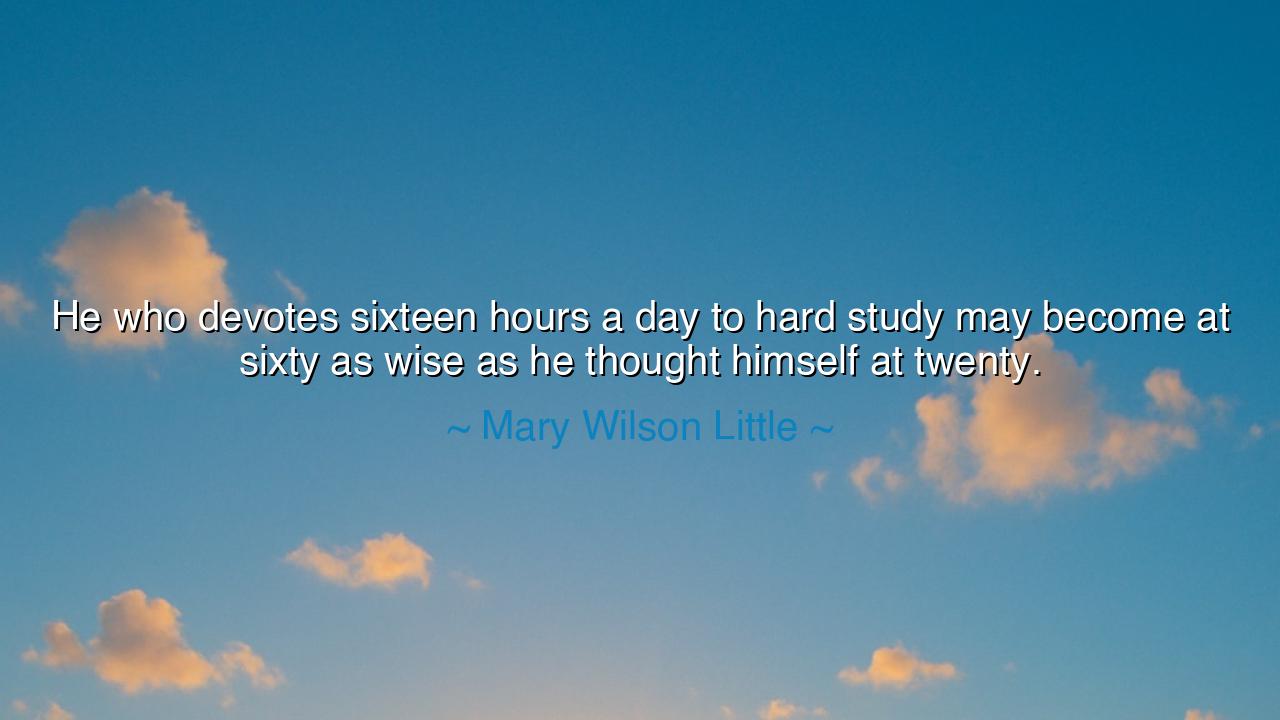
He who devotes sixteen hours a day to hard study may become at
He who devotes sixteen hours a day to hard study may become at sixty as wise as he thought himself at twenty.






Wisdom is not a treasure easily won, nor is it a prize claimed in the spring of youth. When Mary Wilson Little declared, “He who devotes sixteen hours a day to hard study may become at sixty as wise as he thought himself at twenty,” she spoke of the vast distance between knowledge and understanding. In youth, many are bold and certain, believing themselves already wise. But as the years pass and true experience is gained, they discover how little they once knew. Thus, even a lifetime of hard study only brings a person, at last, to the threshold of genuine wisdom.
This quote shines a light on the illusion of youth. At twenty, a person is often filled with untested ideas and pride, mistaking confidence for insight. True wisdom, however, is born not only from books and lessons but from suffering, humility, and the patient accumulation of understanding over decades. By dedicating himself to relentless learning—sixteen hours a day for a lifetime—a man may finally reach the clarity that youth only pretended to possess. It is a humbling reminder that wisdom is earned through time and toil, not assumed through arrogance.
History offers many examples of this journey. Socrates, who spent his life questioning the nature of virtue and truth, famously declared that his only wisdom lay in knowing that he knew nothing. Even after decades of deep thought, he understood the vastness of ignorance. In contrast, many young revolutionaries throughout history have rushed forward with fiery certainty, only to see their ideals collapse when tested by reality. This is the essence of Little’s teaching: that wisdom is not a sudden revelation, but the slow ripening of the soul.
The quote also speaks to the discipline of learning. Sixteen hours a day represents a life of sacrifice and unyielding focus. Such devotion mirrors the lives of great scholars like Leonardo da Vinci or Isaac Newton, who spent countless hours exploring the mysteries of nature and humanity. Yet even they, with all their brilliance, approached their final days with humility, knowing that the universe was far greater than their grasp. Their lives prove that the pursuit of wisdom is endless, and that its full measure may never be attained.
There is also a lesson of humility for the listener. To think oneself wise at twenty is natural, but dangerous. The true seeker of wisdom must be willing to be wrong, to fail, and to learn anew. The path to understanding is paved with mistakes and corrections, and those who embrace this path will grow in strength and depth. By the time they reach sixty, they will not only possess knowledge, but also the humility and perspective to wield it rightly.
Let this teaching be passed to future generations: wisdom ripens slowly, like fruit on the highest branch. Youthful certainty is a mirage, while true understanding demands labor, patience, and time. Devote yourself to study and reflection, not for glory, but for the joy of seeing more clearly. For in the end, the wisest among us are those who know how long and winding the road to wisdom truly is.






HDBui Hai Dang
I’m curious about scope. You can be encyclopedic in one field yet unwise in life. What portfolio of disciplines best converts learning into sound judgment? I’d propose a backbone of statistics, history, moral philosophy, cognitive science, systems thinking, and clear writing—then one craft practiced to excellence. Could you sketch a ten-year curriculum with seasonal themes, capstone projects, and public teaching moments that force synthesis? Also, a pruning ritual: each year, decide what to abandon so depth increases, not just the stack of unintegrated facts.
PHphan hieu
This also raises equity questions. Who can afford relentless study? Caregivers, shift workers, and people juggling multiple jobs often can’t. How do we democratize mastery when time is scarce? I’d love a plan built on compounding: fifteen-minute retrieval drills, micro-lectures during commutes, peer circles that meet monthly, and project-based learning that doubles as paid work. Include a budget approach—public libraries, used texts, open courses—and a resilience clause for setbacks. What evidence suggests small, consistent investment can rival heroic marathons over decades?
GDGold D.dragon
I hear a quiet joke about youthful certainty. Many of us felt omniscient in our twenties; later we discover calibration. How would you operationalize “getting wiser” so it’s measurable? I’m imagining a personal scoreboard: forecast key outcomes and track Brier scores, run pre- and post-mortems on decisions, invite annual 360° feedback on judgment and empathy, and keep a “reasons I changed my mind” log. What other markers—epistemic humility, better base-rate use, fewer impulsive reversals—signal that knowledge has matured into wisdom?
TBToan Bui
As a reader, I love the ambition but question the biology. Neuroplasticity thrives on cycles: sleep consolidates memory; monotone grind often backfires via diminishing returns. Wisdom also needs moral judgment, not just information density. What’s the sustainable cadence—a few focused blocks, deliberate rest, weekly synthesis—that preserves relationships and health? Could you outline an evidence-based study architecture that aims for depth across decades, not just raw hours, with well-being checkpoints so the pursuit doesn’t erode the very life it hopes to enrich?